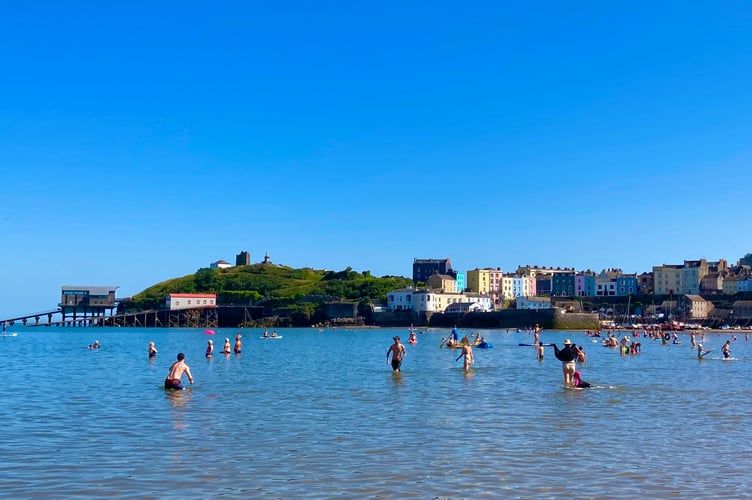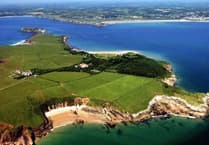Elevated levels of bacteria at Tenby’s North Beach in September may continue to impact the beach’s bid to regain its Blue Flag status, with such recent readings also threatening the seaside town’s South and Castle Beaches.
Dŵr Cymru/Welsh Water has come in for heavy criticism in recent times, with the Water company due to appear before the Welsh Affairs Committee last week following its admission that it has been illegally dumping untreated wastewater at dozens of sewage plants.
At the recent meeting of Tenby Town Council, Cllr. Duncan Whitehurst who has been highlighting pollution concerns across the town in recent months, reported back to his fellow councillors on a recent meeting of the Tenby Clean Seas Working Group.
He said Dŵr Cymru had expressed concerns that Beach Alerts were being mis-reported as pollution incidents; but sadly, the North Beach returned elevated levels of bacteria in September which may continue to impact a bid to regain its Blue Flag status.
South Beach and Castle Beach also had higher levels in June, July and September which could affect their Blue Flags, but none of the agencies at the meeting could identify the cause but would continue investigations.
Cllr. Whitehurst added that the readings on North Beach were actually better than some of the beaches in the county that had Blue Flags and was optimistic.
“It’s a lot cleaner than when I used to swim there in the 1970s,” he remarked.
Dŵr Cymru had been asked about the capacity of the Gumfreston Treatment Works to deal with the increased population during the summer and weekends as it was noticed that many of the alerts were at these times.
The treatment works had been designed to handle waste from 39,000 properties but could cope with more. They were confident that it could process the amount of waste coming into the site at all times.

The Salterns pumping station rising main has been identified as a high-risk asset and had been given high priority for funding improvements.
Kelly Jordan, Dŵr Cymru’s River Quality Liaison Manager for West Wales had presented a preview of the water company’s live reporting app which will provide real-time information to the public.
In conclusion, Cllr Whitehurst said it was time for Dŵr Cymru and Natural Resources Wales to conduct further investigations into establishing the source of occasionally poor bathing water quality results and take action to prevent high levels of bacteria in the sea.
“Along with improved testing comes an expectation from the public that the agencies responsible identify the cause and take action to put it right,” he said.
“Dŵr Cymru and NRW have made specific efforts to do this, and most of the time, our seas are safe to swim in. However, while some of our beaches continue to fail basic water quality standards, more work needs to be done,” he added.
Cllr. Laurence Blackhall thanked his colleague for the feedback and the outstanding depth of information provided.
He said that Cllr Whitehurst had succeeded in bringing the relevant agencies together around the table to have conversations together in front of other people.
“The Salterns and the other work they have been talking about was not on a priority list prior to these conversations. Tenby is coming under more scrutiny and it shows that town and community councils can impact on what happens, and can make a difference,” added Cllr Blackhall.





Comments
This article has no comments yet. Be the first to leave a comment.